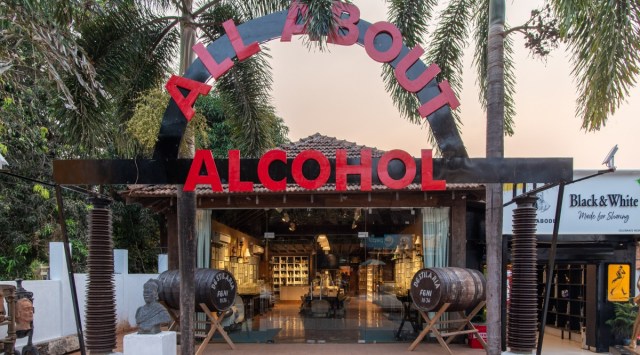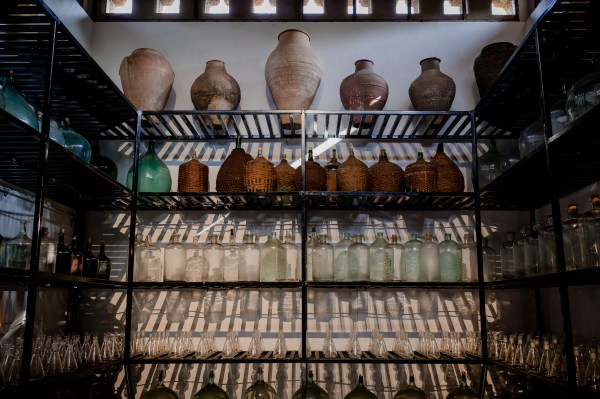- India
- International
All About Alcohol: Goa gets a museum dedicated to feni
The sprawling five-room museum documents how feni, distilled from fermented cashew apples, has been produced, transported and consumed over centuries.
 Spread across 13,000 sq ft in the beach village of Candolim, the All About Alcohol museum offers a potent brew of history and Goan culture.
Spread across 13,000 sq ft in the beach village of Candolim, the All About Alcohol museum offers a potent brew of history and Goan culture.For the average tourist on vacation in Goa, a visit to a museum may figure quite low on their travel itinerary. But businessman and collector Nandan Kudchadkar’s latest venture — a museum dedicated to the “art of drinking” — offers a fresh perspective on India’s unofficial ‘party capital’.
From antique glassware sourced from across the world, to its very own Goan-style tavern — the ‘All About Alcohol’ museum, spread across 13,000 sq ft in the beach village of Candolim, offers a potent brew of history and Goan culture. At its core is the pungent homegrown drink Kudchadkar describes as the “greatest Goan product” — feni.
“To me, Feni is an ode to my motherland,” the businessman tells the indianexpress.com. The sprawling five-room museum documents how feni, distilled from fermented cashew apples, has been produced, transported and consumed over centuries. Thousands of multi-coloured garrafões (large-bellied glass bottles), used to hold the spirit, line its walls. The museum also features its own cellar, which houses row on row of cashew and coconut feni dating back to the 1950s. At the very end of the 30-minute tour, conducted by Goa native Armando Duarte, visitors can sample some craft feni cocktails, whipped up by in-house mixologist Lionel Gomes.
 Goan businessman and collector Nandan Kudchadkar.
Goan businessman and collector Nandan Kudchadkar.
For the uninitiated, feni can be quite intimidating, both Gomes and Kudchadkar admit. “Most visitors will say that they do not like the aroma of it, or that the taste is too strong,” Gomes says. To ease them into it, Gomes and Kudchadkar spent months trying to come up with the “perfect feni cocktail”. At the tavern, one can now savour all three of their signature concoctions, the recipes for which are available to whoever wants them, Kudchadkar proudly says.
But beyond feni, the museum also has an impressive collection of alcohol-related paraphernalia on display. A rare crystal Australian beer horn sourced from Russia, an antique wooden shot dispenser, ancient mud pots, beakers, measuring equipment from the 16th century and glassware from across the globe — these are only some of the wares, handpicked from Kudchadkar’s personal collection, featured in the museum.

 The museum features its very own Goa-inspired tavern, where visitors can enjoy a range of Feni-based cocktails.
The museum features its very own Goa-inspired tavern, where visitors can enjoy a range of Feni-based cocktails.
He spent a year on research — understanding the history and culture of alcohol, and how to tie it to Goa’s own unique story.
For Kudchadkar, alcohol is much more than just a social lubricant, elegantly sipped from identical long-stemmed glasses at an intimate dinner party, or guzzled straight from the bottle at a packed nightclub. At his museum, he seeks to move the spotlight from the beverage itself, to the story behind it.
“The problem is nobody really tells you what alcohol is, or how intoxication starts,” he explains. “This is the place where we show you what is what. We show you the beauty of sipping a drink from a glass made in the 1500s. We show you how some of the finest glass factories of yesterday were destroyed.”
 The museum also has its own cellar, housing thousands of bottles of feni dating back to the 1950s.
The museum also has its own cellar, housing thousands of bottles of feni dating back to the 1950s.
His goal, when he inaugurated the museum on August 13 this year, was to change the way people perceive the act of drinking in Goa. “Historically, Bollywood films have depicted Goans as drunks,” he says. “This is not so. We Goans know how to drink.”
Ironically, it was during the coronavirus pandemic — when businesses across the country were lowering their shutters and people were confined to their homes — that the idea first struck Kudchadkar. “Drinking during the pandemic shifted from restaurants to homes,” he explains. “Even if you’re just calling a couple of friends home for a drink, the euphoria of enjoying a drink was a good way to get your mind off the tensions of the world.”
In the next month, the businessman plans to add five more rooms to the museum, to showcase some more rare gems from his expansive collection. “What you see here is not even a fifth of what I have,” he says.
Apr 27: Latest News
- 01
- 02
- 03
- 04
- 05




































